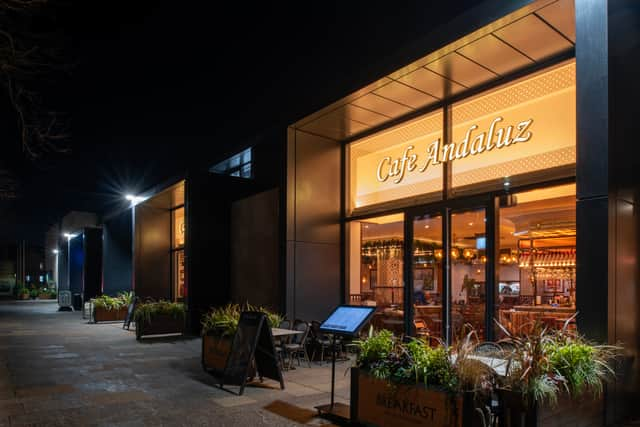Glasgow-based restaurant group chief reveals plans for new venues across UK amid calls for more government support for wider sector
and live on Freeview channel 276
Mario Gizzi, co-founder of DRG, owners of brands including Di Maggio’s, Cafe Andaluz, and Amarone, has revealed the group is ‘actively looking’ at potential sites for a second Cafe Andaluz in Newcastle, three years after opening its successful Grey Street restaurant in the city in 2021. The group is also exploring locations for a first venue in the UK’s capital.
DRG opened a third Cafe Andaluz in Edinburgh in November last year, with the new Stockbridge venue proving a big hit in the neighbourhood. Almost 20,000 people have already visited the restaurant since it opened, making it one of the brand’s most successful new openings to date.
Advertisement
Hide AdAdvertisement
Hide AdThe announcement comes hard on the heels of the group’s busiest December since 2019, with combined sales across the group’s 17 venues in Glasgow, Edinburgh, Aberdeen, and Newcastle up 10% on the previous year.


Gizzi, who founded DRG in Glasgow with his uncle Joe Conetta in 1985, said: “The reception to the Stockbridge Cafe Andaluz has been exceptional and is exactly why we chose that location. It’s another pillar in the progression of the business, and we have plans to grow the brand further. “We have a strong portfolio of brands across a broad range of sectors and food types, and our plans are about growing what we have. We are actively looking at a site for a second Cafe Andaluz in Newcastle, and beyond that we intend to take the brand and potentially other restaurants into London as well. We are researching suitable locations, and that includes the potential acquisition of other restaurant businesses with a view to converting sites into one of our existing brands if the opportunity is right.
“We’ve been in business for 40 years because we take a responsible and measured approach to growth, only moving when the opportunity is right for the business, and that will continue to be fundamental to our approach.”
Gizzi, who trained as a chartered accountant in the 1980s, runs DRG with cousin Tony Conetta, who stepped into his father’s role following his retirement in 2000. The group now employs close to 1,000 people across its venues and has introduced training schemes including an in-house modern apprenticeship to help encourage more people into hospitality as a long-term career.
Advertisement
Hide AdAdvertisement
Hide AdThe business has recovered strongly from the impact of the Covid-19 pandemic – during which it did not make a single member of staff redundant – and is now performing well above pre-pandemic levels of trade. However, whilst DRG has bounced back, Gizzi says others have not been so lucky, and the hospitality veteran, a vocal champion of the industry in Scotland, believes the Scottish and UK Governments must do more to support the sector – particularly on rates and VAT.
He added: “Due to the way we run the business we had a strong balance sheet and were able to dig into reserves to look after our team. That wasn’t the case for everybody and help is needed.
“The current business rates system in Scotland is totally outdated and causes the licensed trade to lose 8.5% of turnover. Good operators are effectively penalised for their success by paying more for the same premises that poorer performing businesses would – that can’t be right. In England, hospitality firms receive relief on rates, and we’d like to see the Scottish Government take the same approach to help stimulate the industry, encourage new businesses to the country, and reward them for running businesses well.
“At a UK level, discounted VAT rate for hospitality would help. We’re a very labour-oriented business, and cost factors in the business are going up all the time through wage inflation and utilities costs. The industry has been battered. Hospitality businesses on the continent pay far less VAT, and we’d like to see a rate of around 8%. That would make a difference.”
Comment Guidelines
National World encourages reader discussion on our stories. User feedback, insights and back-and-forth exchanges add a rich layer of context to reporting. Please review our Community Guidelines before commenting.
